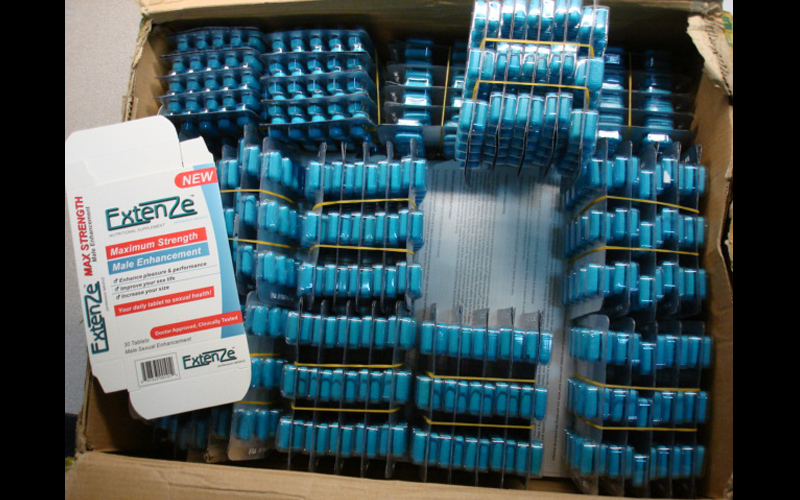Archived Content
In an effort to keep ICE.gov current, the archive contains content from a previous administration or is otherwise outdated. This information is archived and not reflective of current practice.
Long Beach man sentenced for selling phony, lead-tainted male enhancement pills over the Internet
LOS ANGELES — A Long Beach man was sentenced Monday to 10 months in prison for illegally importing thousands of counterfeit, Chinese-made male enhancement pills to sell on eBay that were subsequently found to contain hazardous levels of lead.
Shem Michahdavid Weissman, aka Brody Gold, 24, pleaded guilty in February to one count of trafficking in counterfeit goods, admitting he ordered thousands of counterfeit ExtenZe tablets from a China-based manufacturer and had them shipped to a rented mailbox in Los Angeles. Upon completion of his prison term, Weissman will be subject to three years' supervised release.
The charges stem from a probe by U.S. Immigration and Customs Enforcement's (ICE) Homeland Security Investigations (HSI) with assistance provided by the Food and Drug Administration (FDA) - Office of Criminal Investigations. Weissman was indicted in September 2012 on six criminal counts, including trafficking in counterfeit goods and introducing a misbranded drug into interstate commerce. The case was prosecuted by the U.S. Attorney's Office for the Central District of California.
Authorities began investigating Weissman in December 2010 after U.S. Customs and Border Protection (CBP) officers at a northern California mail screening facility intercepted a parcel from China addressed to Brody Gold that was found to contain 1,800 ExtenZe tablets. One month later, in January 2011, CBP officers at the same mail facility intercepted a second package addressed to Gold containing 6,000 counterfeit pills. Two days after that seizure, HSI special agents received information the defendant was expected to pick up three more parcels from his rented mailbox. Shortly after Weissman left the mail facility, investigators pulled him over and recovered three additional packages containing 15,000 counterfeit ExtenZe tablets, bringing the total number of pills seized in the case to 22,800.
Subsequently, samples of the seized tablets were sent to a lab for analysis where tests revealed they contained Tadalafil, the active ingredient in prescription erectile dysfunction medication. Legitimate ExtenZe tablets are considered a supplement and contain no active pharmaceutical ingredients. The tests also showed the counterfeit pills contained more than 140 percent of the allowable levels of lead.
"This sentence should serve as a warning about the consequences facing those who sell counterfeit consumer products over the Internet," said Claude Arnold, special agent in charge for HSI Los Angeles. "The case is also a sobering reminder about the risks for consumers who purchase such products online from unknown sources. Never has the expression 'buyer beware' been more true."
"The FDA has alerted consumers to hundreds of tainted products marketed as dietary supplements," said Lisa Malinowski, special agent in charge, FDA-Office of Criminal Investigations, Los Angeles Field Office. "Criminal violators who manufacture and sell tainted supplements will continue to be targeted by the FDA's Office of Criminal Investigations and its law enforcement partners."
As the largest investigative arm of the Department of Homeland Security, HSI plays a leading role in targeting criminal organizations responsible for producing, smuggling, and distributing counterfeit products. HSI focuses not only on keeping counterfeit products off our streets, but also on dismantling the criminal organizations behind such illicit activity.
As the federal agency responsible for the management, control and protection of U.S. borders, CBP is on the frontline of intellectual property enforcement. The men and women of CBP protect our nation's economy, the safety of its people and our national security against harm from counterfeit and pirated goods. The continued vigilance of CBP personnel protects United States citizens and businesses every day.
"CBP is the first line of defense in stopping illegal and potentially dangerous goods from entering the U.S.," said Brian J. Humphrey, CBP director of field operations in San Francisco. "Many consumers fail to realize the hidden dangers when purchasing and using counterfeit products. Fortunately, in this case not only was the contraband interdicted at the border, but through interagency cooperation the importer was prosecuted."
In fiscal year 2012, intellectual property rights enforcement by HSI and CBP led to the seizure of more than 22,000 items and 697 websites involved in trafficking these goods. The seized goods had a total value of more than $1.26 billion, based upon the manufacturer's suggested retail price had the products been legitimate.


